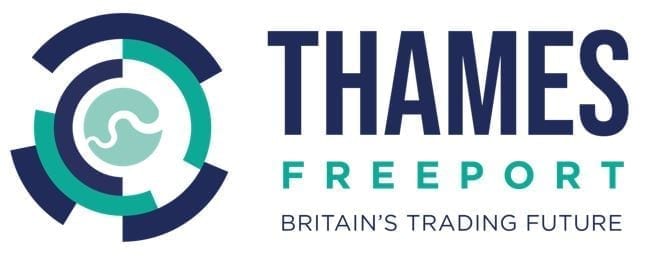
The two ports which make up Thames Freeport received more new enquiries from businesses looking to relocate to the site this month than at any point in the last decade, following the shortlisting of the bid by the Government on 3 March.
After declaring that Thames Freeport is “open-for-business” to fast forward the economic recovery from the pandemic, enquiries at London Gateway and the Port of Tilbury have ranged from fresh space for industrial processes, manufacturing and logistics centres to electrification hubs, innovation incubators and support services as businesses look to utilise the development-ready, low tax and pro-trade platform.
Thames Freeport is a digitally linked economic zone connecting Ford’s world-class Dagenham engine plant, the global ports at London Gateway and Tilbury, and many communities in urgent need of ‘levelling-up’. Businesses looking to expand are being urged to take advantage of the tax benefits of relocating to the Freeport and being part of a customs zone, which will enable the businesses to continue to have low friction trade processes with the EU and global markets. The Freeport will be a centre of excellence for the country as we electrify, automate and digitise our future.
Government freeport policy objectives are to establish national hubs for global trade and investment; regenerate and levelling up areas of need; and create hotbeds of innovation.
Alan Shaoul, Chief Financial Officer at DP World in the UK (owner of the port and logistics park, London Gateway) commented:
“We have seen a surge of interest in the last four weeks from businesses who want to understand more about the benefits of locating or expanding at Thames Freeport as the economy continues to recover briskly from the pandemic.
“Our London Gateway site alone has almost 10m square feet of land that has planning consent. This oven-ready land means that we have the capacity to expand our operational area, and therefore attract new foreign direct investment, within months not years.”
Stuart Wallace, Chief Operating Officer at Forth Ports (owner of the Port of Tilbury and Tilbury2) commented:
“We’ve made an early commitment across the Thames Freeport sites backed by substantial investment to ensure our facilities and development areas are ripe for fresh business growth opportunities.
“Our sites provide first-class global and domestic connections for businesses looking to site their activities at the heart of Europe’s biggest consumer market and a resurgent industrial cluster to develop low carbon logistics solutions.”
Over the coming months and ahead of the awarding of a licence to operate in Q4 2021, the Thames Freeport partnership will be working with the Government, Thurrock Council, Barking and Dagenham Council, the South East LEP, the Thames Estuary Growth Board, the Port of London Authority and other partners to work up an outline business case for a range of activities to be delivered in the first five years of operation and beyond. These range from multi-million pound infrastructure improvements and a range of programmes covering innovation, skills development, digital connectivity, low carbon solutions and the hydrogen economy.
See the Thames Freeport website / Twitter / LinkedIn pages for more information.
Notes
English freeports shortlist announced in The Budget on 3 March (here).
Thames Freeport benefits include:
- £5.1 billion additional GVA
- Over £4.5 billion in new public and private investment
- 25,000+ new jobs with many more across supply chains, with significant investment in training and skills
- 1,700 acres of development land – much with planning consent
- £400 million port investment into some of the most deprived areas
- 20% of the UK’s most deprived communities are in London and the South East
- Freeports are in our DNA – DP World began as a free trade zone in Jebel Ali, while Tilbury was a freeport until 2012.
DP World and Forth Ports are progressing a Thames Freeport, with London Gateway, the Port of Tilbury, Ford’s Dagenham engine plant and the Thames Enterprise Park (TEP) at its heart – highlighting the role of the River Thames in a prosperous, global Britain. TEP will be a customs sub-zone.
The Thames Freeport will allow Ford to transition to a future of automated, connected, electric vehicles.
The Thames Freeport is backed by local MPs, alongside the Association of South Essex Local Authorities, Barking and Dagenham Council, Basildon Council, Be First, Brentwood Council, Castle Point Council, Essex Chamber of Commerce, Essex County Council, London First, Opportunity South Essex, the Port of London Authority, the Rail Freight Group, Rochford Council, Southend Council, the Thames Estuary Growth Board, Thurrock Business Board, Thurrock Council and the South East LEP.